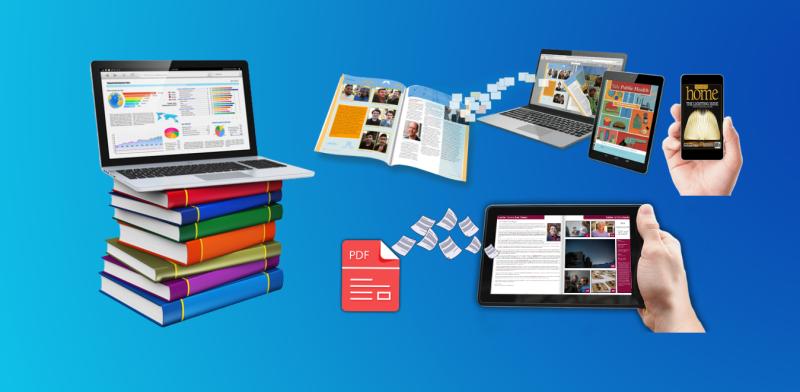7 Features of PDF to Magazine Software you need to know!

In the present age, transforming static
PDFs into interactive magazines is a game-changer for publishers, marketers,
and designers. If you are looking to create captivating digital publications, PDF
to magazine software is your go-to tool.
What is PDF to Magazine Software?
It is a specialized tool that converts
static PDF documents into dynamic, interactive digital magazines. Unlike
traditional PDFs, digital magazines created with this software often include
multimedia elements such as videos, animations, and interactive links. These
tools are invaluable for businesses and individuals who want to make their
content more engaging and accessible online.
This software isn't just for tech experts.
It's designed to be user-friendly, making it easy for anyone to create
professional-quality digital publications. Whether you're a small business
owner, a marketer, or a designer, this software can help you produce visually
stunning and interactive content.
The market for PDF to magazine software has
grown rapidly, with numerous options available, each offering a unique set of
features. Understanding these features is crucial to selecting the software
that best meets your needs.
7 Features of PDF to Magazine Software You Need to
Know
1. User-Friendly Interface
A user-friendly interface is essential for
any software program, and PDF to magazine tools are no exception. The software
should have an intuitive layout that allows users to easily import PDF files,
add multimedia elements, and make edits without needing extensive technical
knowledge.
Look for software that offers drag-and-drop
functionality, which makes it easier to arrange content and customize layouts.
Clear navigation and helpful tutorials or guides can also enhance the user
experience, enabling you to create stunning digital magazines with minimal
effort.
A user-friendly interface not only saves
time but also reduces the learning curve, making it accessible for everyone,
from beginners to experienced designers.
2. Interactive Elements
Interactive elements are what set digital
magazines apart from traditional PDFs. These features can include clickable
links, embedded videos, audio clips, and animations. Adding these elements can
significantly enhance the reader's experience by making the content more
engaging and interactive.
For example, incorporating a video tutorial
or an audio interview within your magazine can provide additional value to your
readers. Interactive elements can also include clickable buttons that lead to
external websites, social media pages, or other resources, driving more traffic
to your online platforms.
These features not only make the content
more interesting but also encourage readers to spend more time engaging with
your magazine, increasing their overall satisfaction.
3. Mobile Responsiveness
In today's mobile-first world, it's crucial
that your digital magazines are optimized for viewing on various devices,
including smartphones and tablets. Mobile responsiveness ensures that your
magazine looks great and functions well, regardless of the device used to view
it.
The software should offer responsive design
options that automatically adjust the layout and functionality of your magazine
based on the screen size. This ensures that readers have a seamless experience,
whether they're accessing your content on a desktop computer or a mobile
device.
Mobile responsiveness is not just about
aesthetics; it's also about usability. A mobile-friendly magazine is easier to
read and interact with, which can lead to higher engagement rates and better
reader retention.
4. Customizable Templates
Customizable templates are a valuable
feature that can save you time and effort in designing your digital magazine.
These templates provide a pre-designed layout that you can easily modify to fit
your brand's style and requirements.
Look for software that offers a variety of
templates suited for different types of content, such as newsletters, catalogs,
and brochures. This versatility allows you to create multiple types of
publications without starting from scratch each time. Fortunately, there is a
software solution called Enhanc PDF to
magazine software available in the online market that offers a range of
templates.
5. Analytics and Reporting
Understanding how readers interact with
your digital magazine is crucial for improving future editions. Analytics and
reporting features provide valuable insights into reader behavior, such as
which pages are most viewed, how much time readers spend on each page, and what
interactive elements are clicked the most.
These insights can help you identify what
content resonates with your audience and what areas need improvement. Look for
software that offers detailed reports and easy-to-understand analytics
dashboards.
Having access to this data allows you to
make informed decisions about your content strategy, ensuring that each edition
of your magazine is better than the last. It also helps you demonstrate the
value of your digital publications to stakeholders and advertisers.
6. Cloud-Based Storage and Access
Cloud-based storage and access provide
flexibility and convenience, allowing you to work on your digital magazine from
anywhere with an internet connection. This feature is particularly useful for
teams, as it enables multiple users to collaborate on a project in real-time.
Cloud-based solutions also offer secure
storage for your files, reducing the risk of data loss due to hardware
failures. Look for software that provides ample storage space and robust
security measures to protect your content.
With cloud-based access, you can easily
share your magazine with others, whether it's team members for collaboration or
readers for distribution. This feature enhances productivity and ensures that
your magazine is always accessible when you need it.
7. Print-Ready Options
While digital magazines are increasingly
popular, there may still be occasions when you need a print version of your
publication. PDF to magazine software that offers print-ready options ensures
that your digital content can be easily converted into a high-quality print
format.
Look for software that provides
high-resolution export options and supports various print formats. This ensures
that your magazine looks just as stunning in print as it does online.
Having print-ready options gives you the
flexibility to cater to different audience preferences, whether they prefer
reading online or holding a physical copy. It also allows you to expand your
reach and distribution channels, maximizing the impact of your content.
Final Words
In the rapidly evolving digital landscape,
having the right tools to create engaging and interactive content is essential.
PDF to magazine
software offers a powerful solution for transforming static PDFs into dynamic
digital publications. By understanding and leveraging the key features
discussed in this write-up, you can create stunning magazines that captivate
your audience and elevate your brand.
From user-friendly interfaces and
interactive elements to mobile responsiveness and customizable templates, these
features provide the foundation for a successful digital magazine. Further,
analytics and reporting, cloud-based storage, and print-ready options offer
added value and flexibility, ensuring that your publications meet the highest
standards.
Are you ready to take your digital publications
to the next level? Take a free trial of Enhanc PDF to magazine software today!
